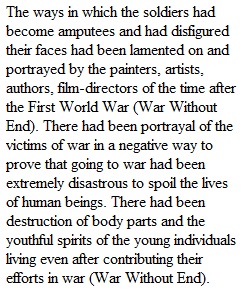


Q HST1150 NORTHEASTERN UNIVERSITY Spring 2020 Civilizations of the College of Professional Studies Hiltz Modern World Essay Question – #2 “I sat a long while and thought of all sorts of things. Among others, of how we came back from the war, like miners from a pit of disaster, young and disillusioned of everything but ourselves. We had meant to wage war against the lies, the selfishness, the greed, the inertia of the heart that was the cause of all that lay behind us; we had become hard, without trust in anything but in our comrades beside us and in things – the sky, trees, the earth, bread, tobacco, that never played false to any man, -- and what had come of it? All collapsed, perverted and forgotten. And to those who had not forgotten was left only powerlessness, despair, indifference and schnapps. The day of great dreams for the future of mankind was past. The busybodies, the self-seekers triumphed. Corruption . . . Misery. . .” (Erich Remarque, Three Comrades) In 1928/29 (setting date for Three Comrades) the youth generations who had so overwhelmingly volunteered themselves for the great cataclysm expected to bring about a new world free of the old world’s anxieties, found instead that their sacrifices had been wasted, and that the War had claimed all who were associated with it as its victims; not alone the dead and the physically scarred, but an entire civilization held prisoner by its inhumanity, insanity, and obscene horror. Even those who waited at home could not escape the trauma brought back to them from the front by telegrams which informed them ‘regretfully’ of a personal loss, or by those, apparently, more fortunate who returned home carriers of the disease of physically, emotionally, and mentally shattered lives. The War was not the only means, perceived by that generation, to change or save the world. Still other youth flocked to the funeral of Imperial Russia where revolution held out the same hope of “a new heaven and a new earth”, but experienced, instead, the same kind of use, abuse, and disillusionment in revolution that the majority of their generation had come to know through War. T. E. Lawrence (Lawrence of Arabia) spoke for himself, but perhaps for his and other generations as well who have been sacrificed for a questionable purpose, when he stated in his autobiography, The Seven Pillars of Wisdom: “…and when the victory was won and the new day dawned, the old men came out again and took from us our victory, and remade the world in the image they knew. Youth could win, but had not learned how to keep, and was pitiably weak against age. We stammered that we had worked for a new heaven and a new earth, and they thanked us kindly and made their peace. Surely we will treat our children so.” Yet, despite the fact that these authors and others (there were over 80 war memoirs published in 1929) had been volunteers and veterans themselves, and many of them decorated for and wounded in their war service (Remarque had been wounded 6 times), the ‘Myth of the War Experience’ and the ‘Cult of the Fallen Soldier’ would condemn these men and their writings, and their alleged pacifism, as evil and dangerous. What constituted the ‘Myth of the War Experience’; whose interests did it serve; and what was its contribution to a Second World War? Note: in your answer be sure to use specific examples drawn from Mosse’s Fallen Soldiers – you should also use examples available from the film “War Without End” (Assigned in Week XII). Finally, you can also make use of the poems from Wilfred Owen and Siegfried Sassoon available with the ‘Web Link’ access folder for “War Without End”. This question should be answered in an essay of approximately 6 (six) double-spaced pages using only materials available to you in the course. Quotations and para-phrasings should be cited using 'scientific notation' at the end of the referenced passage: example -- (Fallen Soldiers, p. 30) or (Mosse, p. 30). There is no need of a Bibliography (works cited page), because you will be using only materials available in the course. This 2nd Essay Question is due to be submitted by 11:59PM (EDT), on Saturday, April 25th.
View Related Questions